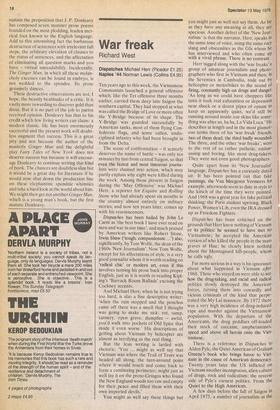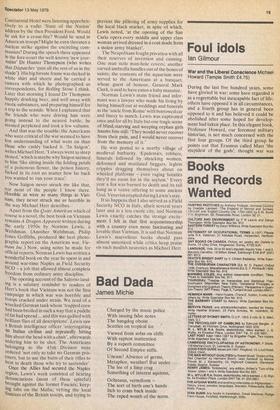War freak
Richard West
Dispatches Michael Herr (Picador £1.25) Naples '44 Norman Lewis (Collins E4.95) Ten,years ago to this week, the Vietnamese Communists launched a general offensive which, like the Tet offensive three months earlier, carried them deep into Saigon the southern capital. They had stopped at what was called the Bridge of Love or more often the Y-Bridge because of its shape. The Y-Bridge was guarded successfully by American tanks, most of them flying Con federate flags, and some sullen, undisciplined infantry who had been brought in from the Delta.
The scene of confrontation — it scarcely deserves the name of battle — was only ten minutes by taxi from central Saigon, so that even the laziest and most timorous journalists were shamed into action, which may partly explain why eight were killed during the week. Among those present in Saigon during the 'May Offensive' was Michael
Herr, a reporter for Esquire and Rolling Stone who had already spent sik months in the country almost entirely on military stories, and now ten years later, comes up with his reminiscences.
Dispatches has been hailed by John Le Carre as 'the best book I have ever read on
men and war in our time', and much praised by American writers like Robert Stone, Irwin Shaw (lough, compassionate also, significantly, by Tom Wolfe, the dean of the 1960s 'New Journalism'. Now Tom Wolfe, except for his affectations of style, is a very good journalist whom it is worth reading on 'radical chic' or modern art, even if this involves turning his prose back into proper English, just as it is worth re-reading Kipling's 'Barrack Room Ballads' excising the Cockney accents.
And Michael Herr, when he is not trying too hard, is also a fine descriptive writer: 'when the rain stopped and the ponchos
came off there was a smell that I thought was going to make me sick: rot, sump,
tannery, open grave, dumpfire — awful, you'd walk into pockets of Old Spice that made it even worse.' His descriptions of getting about Vietnam by helicopter are almost as terrifying as the real thing.
But the lean writing is larded with rhetoric: 'You ... might as well say that Vietnam was where the Trail of Tears was headed all along, the turn-around point where it would touch and come back to
form a continuing perimeter; might just as well lay it on the proto-Gringos who found the New England woods too raw and empty for theirtpeace and filled them with their own imported devils.'
You might as well say these things but you might just as well not say them. As far as they have any meaning at all, they are specious. Another defect of the 'New Journalism' is that the narrator, Herr, speaks in the same tone of voice, using the same racy slang and obscenities as the GIs whom he has interviewed and who often come up with a vivid phrase. There is no contrast.
Herr tagged along with the 'war freaks' a group of amateur journalists and photographers who first in Vietnam and then, in the Seventies in Cambodia, rode out by helicopter or motorbikes to the sound of firing, constantly high on drugs and danger. 'As long as we could have choppers like taxis it took real exhaustion or depression near shock or a dozen pipes of opium to keep us apparently quiet, we'd still be running around inside our skins like something was after us, ha ha, La Vida Loca.' He describes at length and in the most glamorous terms three of his 'war freak' friends, two of them dead, the third badly wounded. The three, and the other 'war freaks', were to the rest of us rather pathetic, embarassing. and boring, like most drug-takers. They were not even good photographers.
Quite apart from its 'New Journalist' language, Dispatches has a curiously dated air. It has been pointed 'out that fake paintings, the Van Meegeren Vermeers for example, afterwards seem to date in style to the kitsch of the time they were painted. And 1968 was a great year for fake political thinking: the Paris student uprising, Black Power, Women's Lib, even the IRA dressed up as Freedom Fighters.
Dispatches has been criticised on the grounds that Herr knew nothing of Vietnam or its politics: he seemed to have met no Vietnamese; he accepted the American version of who killed the people in the mass graves at Hue; he clearly knew nothing about the Montagnard hill-people, whom he calls ugly.
Far more serious in a way is his ignorance about what happened in Vietnam after 1968. Those who stayed on were able to see how the drug-taking, and racial and radical politics slowly destroyed the American forces, turning them into cowardly and vicious criminals of the kind that perpetrated the My Lai massacre. By 1972 there was a very high incidence of drug-induced rape and murder against the Vietnamese population. With the departure of the Americans, the drug peddlars off-loaded their stock of coccaine, amphetamines, speed and above all heroin onto the Vietnamese.
There is a reference in Dispatches to Alden Pyle, the Quiet American of Graham Greene's book who brings havoc to Vietnam in the.cause of American democracy. Twenty years later the US inflicted on Vietnam another incongruous, alien culture of drugs, rock and radicalism: the reverse side of Pyle's earnest politics. From the Quiet to the High American.
A few days before the fall of Saigon in April 1975, a number of journalists at the
Continental Hotel were listening apprehensively to a radio 'State of the Nation' address by the then President Ford. Would he ask for a cease-fire? Would he send in American troops? Might he even threaten a nuclear strike against the encircling communists? During the speech there appeared in the fore-court the well-known 'new journalist' Dr Hunter Thompson (who writes that Dispatches 'puts all the rest of us in the Shade') . His big hirsute frame was decked in White shirt and shorts and he carried a camera with which he photographed us correspondents, for Rolling Stone I think. Later that morning I found Dr Thompson happily drinking beer, and well away with exotic substances, and preparing himself for a trip to the seaside. When I explained that the friends who were driving him were going instead to the nearest battle, he seemed perplexed and took a few valiums.
And that was the trouble: the Americans Who were critical of the war seemed to have less understanding of what went on than those who rashly backed it. 'In Saigon', writes Michael Herr, 'I always went to sleep stoned,' which is maybe why Saigon seemed to him 'like sitting inside the folding petals of a poisonous flower, the poison history, fucked in its root no matter how far back You wanted to run your trace'.
Now Saigon never struck me like that, nor most of the people I knew there. Horrible as were so many things in Vietnam, they never struck me as horrible in the way Michael Herr describes.
Apart from the Quiet American which of course is a novel, the best book on Vietnam remains A Dragon Apparent written during the early 1950s by Norman Lewis, a Welshman. (Another Welshman, Philip Jones Griffiths, produced the best photographic report on the American war, Vietnam Inc.) Now, using notes he made for official reports, Norman Lewis has written a wonderful book on the year he spent in and around war-time Naples as Field Security NCO — a job that allowed almost complete freedom from ordinary army discipline.
The opening account of the Salerno landing is a salutary reminder to readers of Herr's book that Vietnam was not the first campaign in which war was horrible and troops cracked under strain. We read of a wrecked German tank whose 'trapped crew had been broiled in such a way that a puddle of fat had spread ... and this was quilted with brilliant flies of all descriptions'. Lewis saw a British intelligence officer 'interrogating an Italian civilian and repeatedly hitting him about the head with a chair', afterwards ordering him to be shot. The Americans belonging to the 45th Division were ordered 'not only to take no German prisoners, but to use the butts of their rifles to beat to death those who try to surrender'. Once the Allies had secured the Naples region, Lewis's work consisted of hearing denunciations (most of them spiteful) brought against the former Fascists; keeping tabs on the Mafia; vetting the local fiancees of the British troops, and trying to
prevent the pilfering of army supplies for the local black market, in spite of which, Lewis noted, 'at the opening of the San Carlo opera every middle and upper class woman arrived dressed in a coat made from a stolen army blanket'.
The Neapolitans fought privation with all their reserves of invention and cunning. One man stole man-hole covers; another carved umbrella handles out of the bones of saints; the contents of the aquarium were served to the Americans at a banquet, whose guest of honour, General Mark Clark, is said to have eaten a baby manatee.
Norman Lewis's main friend and informant was a lawyer who made his living by hiring himself out at weddings and funerals as the 'uncle from Rome' with borrowed car and finery to match. Lewis was captivated once and for all by Italy but one tragic scene of blind, starving and weeping orphan girls haunts him still: 'They would never recover from their pain, and I would never recover from the memory of it.'
He was posted to a nearby village of medieval barbarity. 'Epidemics, robbers, funerals followed by shrieking women, deformed and mutilated beggars, legless cripples dragging themselves about on wheeled platforms — even raging lunatics they'd no room for in the asylum.' Every year a fox was burned to death and its tail hung as a votive offering to some ancient God. Vesuvius erupted during Lewis's stay.
It so happens that I also served as a Field Security NCO in Italy, albeit several years later and in a less exotic city, and Norman Lewis exactly catches the strange excitement I felt in that first acquaintanceship with a country even more fascinating and lovable than Vietnam.'It is sad that Norman Lewis's marvellous books should pass almost unnoticed while critics heap praise on such modish neurotics as Michael Herr.



































 Previous page
Previous page